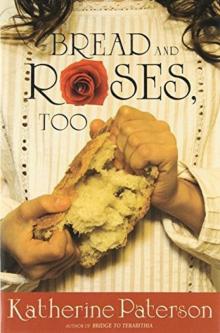- Home
- Katherine Paterson
Bread and Roses, Too Page 15
Bread and Roses, Too Read online
Page 15
Rosa listened in horror. She knew perfectly well that Sal had no permission card and that he had boarded and passed almost unnoticed. But if a mistake had been made with these two boys, the Barre committee would be on the alert for other mistakes. She needed to warn him, but there was no way to do so before that night.
Tony, who was telling her breathlessly about the case, wound up by saying, "And they don't want to go home at all. They got plenty to eat and warm clothes. They like it here. It's a vacation, just like the union promised."
"They don't want to go home?"
"No. They're mad as wet cats."
Oh, if it had only been Rosa, not these silly boys, who was leaving tomorrow. Then she'd be home and she wouldn't have to worry about Mamma and Anna and Ricci anymore, much less Sal and all his problems and lies. It was hardly fair. Boys who didn't want to leave having to go, while she, who wanted so much to go home, must stay. Not only stay, but dream up more lies to help that wretched boy, whose real name and story she didn't even know, except that there was something dark, some shadow he was running away from. Of course, she was curious—anyone would be—but she was also terrified that he might tell her everything, and then she'd have the burden of even more lies as well as some wicked secret to keep hidden.
When she came in from school, she found Sal in the kitchen stuffing his mouth with bread and cheese. She made him leave his snack on the table and come into the hall with her.
"Can't it wait?" he asked grumpily. "I'm eating."
"They're sending two of the boys home to Lawrence tomorrow."
"Oh, yeah," he said, already turning to go back into the kitchen. "I heard already."
"You don't understand." She grabbed his arm. "They'll be checking on everyone now. They think there may have been a mixup boarding the train...."
"Yeah?" He was trying to act nonchalant, but she could tell he was worried.
"Well, what are we going to do?"
"Nothing. I told you I'd be leaving soon."
"But if you run away now, I'm the one who'll have to explain why."
He gave her a wry grin. "You're getting good at explaining. You'll think of something."
He was infuriating. "I have a good mind to march right into that kitchen this minute and tell Mrs. Gerbati everything!"
Alarm crossed his face, but he controlled it. "You wouldn't do that."
"And just why wouldn't I?"
"Because you're in too deep, that's why."
She knew he was right. The Gerbatis trusted her. They wouldn't understand if she suddenly announced that all she had said about Sal had been lies.
"You can tell them one thing, though."
"And what is that?"
"The real reason I can't go to school."
"I thought you'd be too ashamed."
"It'll be worse if they make me go."
She stared at him. He was ashamed—really ashamed—of not being able to read or write even his own name. She wanted to say, I'll teach you, but that might make matters worse.
"Mr. Marchesi come by to tell Mrs. Gerbati I was supposed to be in school, not working. Part of the deal was that the people here would send all the kids to school, not make them work."
"Nobody's making you work, are they?"
"No. I kinda like it. It's not near as hard as the mill. And all the guys are friendly to me. Even the old man ain't too bad."
"Okay," she said finally. "I'll tell them, but I may have to tell the truth."
He reddened, but he nodded. "Whatever you have to do. I can't go to no school."
Rosa went to Mr. Gerbati, who had fetched his afternoon newspaper from the market around the corner and was reading in the sitting room while his wife finished putting supper on the table. "Sal asked me to talk to you, Mr. Gerbati," she began.
He folded the paper on his lap and looked at her over his little metal-rimmed glasses. "He can't talk for himself?"
"He's too ashamed."
"So?"
She took a deep breath. "Sal can't go to school, Mr. Gerbati. He—he's never been, so he would have to start with the little ones. He's too ashamed to be in the first grade with six- and seven-year-olds."
Mr. Gerbati was waiting for her to go on.
"I know it seems strange ... me going to school and my brother not. But—but he was, well, when he was six, he was very sick, and when he got well again, he refused to go. You may have noticed that he's very stubborn." Mr. Gerbati gave a faint smile. "So finally Papa paid the man for the papers, and Sal went to work in the mill. He was as big as some of the older boys, and nobody asks questions at the mill anyway. Besides, we needed the money. Then Papa was killed, and we needed it even worse."
"So, if he's worker, why is he here with children?"
"I—I wouldn't come alone. I was too scared. There was no work with the strike going, and," she put on her saddest face, "he was hungry, too."
Mr. Gerbati ran his finger along the crease of his paper. "When Mr. Broggi go to Lawrence, he promise all the children go to school. Mr. Marchesi tell Mrs. Gerbati today, all the committee know Sal no go to school."
"I know. But you could explain to Mr. Marchesi and Mr. Broggi. Mamma would understand. She won't expect Sal to be in school, only that he behave himself and help you any way he can. We're both so grateful to you and Mrs. Gerbati...."
"Tell your brother next time he speak for himself, si? Not send little sister." He turned back to his paper.
At supper neither of the Gerbatis mentioned the return of the Colonni brothers to Lawrence, nor the visit Mr. Marchesi had paid to check on their charges. But after the old man had finished the last of his wine and his coffee, into which Rosa noticed he poured a bit of grappa from a jug on the counter, he pushed back his chair and addressed Sal. "Your sister say you like work in the shed better than school, yes?"
"Yessir," Sal murmured to his empty plate.
"You work hard, you behave good, I fix with committee, okay?"
"Thank you, sir," Sal said without lifting his head. "Grazie."
"But after work, you gotta study, si? Rosa, she smart girl, she teach you. And I don't want no monkey business, neither. You study good. You go home after strike and you no dumb kid, okay?"
"Yessir."
"Begin tonight. I tell Mr. Broggi and Mr. Marchesi you study at Gerbatis' house, okay?"
So it was all right, at least for now. She'd gotten the wretched boy through one more scrape. It would be nice to think he was grateful, but she doubted it. She began that night at the kitchen table writing "Salvatore Serutti" in big curling letters at the top of the paper that Mrs. Gerbati had found for her. Then below she wrote the alphabet, first in capitals, then in lowercase. "Now copy everything," she ordered, "while I study my own lessons."
He was sweating, holding the pencil tightly in his right fist. She knew he would have objected if the Gerbatis hadn't been in the next room, Mrs. Gerbati smiling with pride over her two charges working away on their lessons at the kitchen table.
Mr. Broggi escorted the Colonni boys to Lawrence the next day on the afternoon train. The word came back that their mother wept with regret when she saw her sons so well dressed. The mill owners' agents had lied to the parents, had pressured them to demand the boys' return, saying that they were being harshly treated in Vermont, that they were no more than slaves to the rough and drunken stonecutters in that godforsaken place. When the boys told them about the parade and the feast at the Labor Hall and how every meal since had been a feast, even the father begged Mr. Broggi's forgiveness. Maybe more children should go to this paradise in the north, the Colonnis said.
Thursday, Mr. Broggi returned. All the children at school were hoping for word from home. So as soon as the dismissal bell rang, Rosa raced back to the Gerbatis', past Mr. Gerbati reading his paper, and into the kitchen, where Mrs. Gerbati had evidently just given Sal a fat slice of bread slathered with butter to "hold his belly" until supper was ready.
"Did my mamma send any word by Mr. Broggi?" Ro
sa asked by way of greeting.
Mrs. Gerbati smiled and pulled a folded piece of paper from her apron pocket. "She write to Rosa," she explained to Sal. "You learn good to read, she write you, too, yes?"
Rosa unfolded the paper. It had been written not by Mamma, but by Anna. Mamma couldn't write well in Italian, much less in English.
Dear Rosa,
How are you doing in Barry, Vermont? We miss you, but Mr. Broggi says all the children ther are doing fine and we must not lisen to lies from the mill people. Ther are a lot of lies about Lawrence children being kidnaped and carried away to New York and Vermont, but Mamma says we know they are lies, jus like the other lies we been told.
Mamma meenS to Send me and Ricci to Filadelfiaon Saturday. I don't want to go, but Ricci is to Jung to go alone and I have been coffing more and Mamma Says I need to go where I can get good food and a warm place to Stay.
We got the post card you Sent and also the pitchur of you and a boy from Mr. Broggi. Who is that boy? You look good, but his fase was blury. Mamma thought Mr. Broggi Said Something about her Son, but Mamma must have got it wrong. I worry the masheens have made her def like Mrs. Marino. By the way Mrs. Marino has been to jail. She hit a milisha with a pot of Slop from her window. They let her go tho. I think Mrs. Marino is to much troble even for the polees. Rite Soon.
Love,
Anna
I forgot to Say. Olga Kronsky Say to tell you Miss Finch bring breakfast for class every day now.
A large tear rolled down her cheek and plopped down on "Filadelfia," making it a smear.
"Bad news, Rosina?"
"No, Mrs. Gerbati. Just ... Mamma is sending my sister and baby brother to Philadelphia on Saturday."
"Aw, Philadelphia. We want more children in Barre. Why go to Philadelphia? Too big city. Barre nice, lotsa nice Italian family here."
She sounded so much like Mamma that it was all Rosa could do to keep from bursting into tears.
"You don't read your mamma's letter to your brother?" Mr. Gerbati was standing at the kitchen door. "Or don't he care for news from home?"
"Oh, yes, sure, of course he cares. I'm sorry, Sal."
Sal looked up from his plate. Mrs. Gerbati had given him a second slice of bread and butter, so he hadn't been paying any attention to the old woman and Rosa. "Huh?"
"It's a letter from Mamma."
"Yeah?"
"Our big sister Anna and our little brother Ricci are going to Philadelphia on Saturday." She realized, a bit late, that it sounded as though she was talking to a dimwit. After all, Sal ought to know who Anna and Ricci were.
"Yeah? That's nice."
"And Mrs. Marino had to go to jail. She—uh—poured—uh—slop from her window on a Harvard boy's head."
"Yeah?" Sal laughed out loud. "Good for her. That would mess up a pretty uniform."
"They—they took her to jail, but Anna says they didn't keep her long. You know Mrs. Marino. Like Anna says, she was probably too much trouble even for the police."
Mrs. Gerbati was looking a bit shocked, but Sal was thoroughly enjoying this bit of news.
"And, of course, everyone sends you their love."
He actually blushed when she said that. Probably it was the first time anyone anywhere had ever sent him love. It was too bad it was just another of her lies.
Tumulto and Treachery
Saturday came. It was the day Anna and Ricci would be going to Philadelphia and leaving Mamma behind with only the Jarusalises for comfort. Rosa went with Mrs. Gerbati to confession where Rosa admitted to telling a number of vague untruths. She didn't venture to be too specific. The priest didn't press her, but gave her the usual Hail Marys and Our Fathers to recite, and they were back, preparing for supper, when the telephone rang. There was a large contraption of wood and metal and wires attached to the wall in the front hall, which Mrs. Gerbati had proudly pointed out to be a telephone. Rosa had never seen anyone using it, and it took her a minute to realize that the ringing noise she heard was inside, rather than outside, the house.
"Ah, il telefono" Mrs. Gerbati exclaimed, wiping her hands on her apron and hurrying into the hall to pick it up. Rosa couldn't help it—she followed Mrs. Gerbati right out the kitchen door. She'd never known anyone actually to talk on a telephone, and she was curious to see how it worked.
"'Ello, 'ello?" Mrs. Gerbati had pulled part of the instrument from the wall and cupped it over her right ear. She was standing on tiptoe, yelling into a sort of raised ring on the front. "Si, si." And from then on she was mostly yelling Si or breathing a hushed No into the instrument. The only thing Rosa was sure of was that the news from the other end was not good. She could read that much from the growing expression of alarm on Mrs. Gerbati's face.
As soon as Mrs. Gerbati replaced the earpiece, Rosa called out to her, "What is it? What's the matter?"
Mrs. Gerbati took her by the hand and led her back into the warm kitchen. "Sit, Rosina."
Rosa obeyed. Mrs. Gerbati sat in the chair beside her, still holding her hand and shaking her head. Suddenly, as though something had just occurred to her, she raised her head and looked about. "Where is Salvatore?"
"I don't know. He said he was going out for a walk after he had his snack. I think he likes to wander around town. He'll be back soon, but you don't need to wait for him...."
"Better we wait for him." She let go of Rosa's hand and patted her knee. "And Mr. Gerbati, too, yes?" Mr. Gerbati had gone to the Labor Hall. He might not even come home for supper.
"Is it about Mamma?"
"Don't worry, bambina. Is all right, all good. You see."
Rosa didn't see anything at all except that nothing was good. Something terrible had happened to Mamma, that was it. Something so terrible that the news had to come by telephone, not telegram or letter. News so terrible that Mrs. Gerbati didn't even dare to tell her. Rosa was shaking all over, despite her warm clothes, despite the warm kitchen. Couldn't Mrs. Gerbati see what she was doing to her? Torturing her with silence? But Mrs. Gerbati had gotten up and gone to the kitchen counter. She took the leftover polenta from the night before, now congealed, and sliced it with a piece of string. She put the neat slices into a cast-iron pan sizzling with olive oil and began to fry them, concentrating on the task as if her life depended on it. If Rosa had thought it would do any good, she would have thrown herself at the old woman's feet and begged her to tell, but she knew Mrs. Gerbati was determined to make her husband the teller of bad news—news so terrible that she could not bring herself to break it.
Finally, Sal came back and, minutes later, Mr. Gerbati. It might as well have been days, as far as Rosa was concerned, for by the time the old man opened the door, Rosa had mentally gone to the DeCesare funeral parlor and seen the bodies of her loved ones laid out like Annie Lopizzo, and then followed the hearse that carried her entire family to paupers' graves in the Lawrence cemetery. Or would the union pay for a proper burial? They ought to. They were at fault. If it hadn't been for the union, she would still have a family.
"Some coffee and bread?" Mrs. Gerbati asked a bit too chirpily as her husband and Sal entered the kitchen. "To comfort the belly after your cold walk?" Both Sal and Mr. Gerbati sat down at the table while she served them. "And you, Rosa?"
Rosa shook her head, unable to speak. She was numb with terrified anticipation. Mrs. Gerbati was sending silent signals to Mr. Gerbati across Sal's head, but the boy seemed to notice nothing but his food. Finally, Mr. Gerbati cleared his throat.
"I hear at the Labor Hall some news," he began. Rosa looked up quickly. Sal kept munching away on his bread. "There was a—a tumulto at the station...."
"What station?" Rosa blurted out.
"In Lawrence. The parents was taking their children to the train."
"To go to Philadelphia?" Rosa could not help herself. She had to know. Why couldn't he go ahead and tell her if Mamma and Anna and Ricci were dead or alive? They must be dead—why else all the delay?
He nodded. "To Philadelphia," he sai
d. "The police—"
"Mamma's dead."
Both Mr. and Mrs.Gerbati started in alarm. "No! No!" They chorused.
"Povera bambina!" Mrs. Gerbati came from the stove and put her arms around Rosa, crushing the girl's face to her wide bosom. "No, no, don't I tell you no worry? Is all right? You tell Rosa is all right," she commanded her husband.
"The police attack the people," Mr. Gerbati continued. "No dead, but some beat with police stick. We don't know 'bout your mamma and sister"—he glanced at Sal, who was still chewing his food—"if hurt or not. We only know Mamma and sister in jail and baby boy took away to somewhere we don't know."
Rosa let out a cry, which prompted Mrs. Gerbati to hug her closer.
"Mr. Broggi, he in touch with union committee in Lawrence. He get more news, he telephone, okay?"
"Why do they do such terrible thing, Mr. Gerbati?" Mrs. Gerbati sounded near to tears herself. "Beat up womens and little childrens and snatch baby away from Mamma? What kind of people do such terrible thing?"
"Only people who fear. Fear make people crazy."
"What have they got to be scared of?" Sal said. He'd stopped chewing and begun to pay attention at last. "They got all the guns."
"Guns don't win this kinda war," Mr. Gerbati said, thumping his chest. "Is heart. Is strong in here."
***
Rosa could hardly eat, and later it was even harder to sleep. Pictures of Mamma and Anna in what she imagined to be the Lawrence jail filled her mind. And little Ricci. Where was he? She couldn't even imagine what must have happened to her poor baby brother. It would be better for him to be in jail, wouldn't it? At least he would be with Mamma and Anna, not carried away by strangers. She was, by turn, hot with anger and cold with fear. Why had she left them? She could have kept them out of trouble if she'd been there. No, probably not. Mamma was a hardheaded Italian woman after all. Well, then ... she would have been in jail with them. Wasn't that better than being here all safe and warm and well fed while everyone she loved was suffering? She began to cry again, quietly into her pillow, so as not to disturb the Gerbatis in the next room.

 The Great Gilly Hopkins
The Great Gilly Hopkins Bridge to Terabithia
Bridge to Terabithia My Brigadista Year
My Brigadista Year Jacob Have I Loved
Jacob Have I Loved Parzival: The Quest of the Grail Knight
Parzival: The Quest of the Grail Knight Lyddie
Lyddie The Day of the Pelican
The Day of the Pelican Stories of My Life
Stories of My Life Bread and Roses, Too
Bread and Roses, Too The Same Stuff as Stars
The Same Stuff as Stars